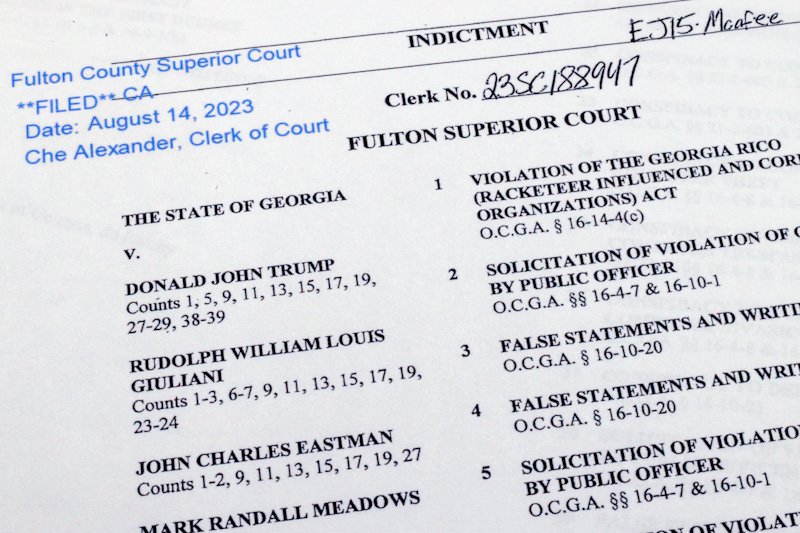Are defendants in Georgia case against Trump entitled to removal? These standards apply

The indictment in Georgia against former President Donald Trump is displayed Aug. 14. Trump and several allies have been indicted in Georgia over efforts to overturn his 2020 election loss in the state. Photo by Jon Elswick/The Associated Press.
U.S. District Judge Steve C. Jones of the Northern District of Georgia on Monday promised to rule “quickly but reasonably” on a bid by former White House chief of staff Mark Meadows to remove the criminal racketeering case against him from Fulton County, Georgia, to federal court.
Meadows argues that his removal is allowed because the charges relate to actions undertaken under color of federal office. A handful of Meadows’ co-defendants are also seeking removal.
Meadows is among 19 defendants to face allegations that they violated Georgia’s Racketeer Influenced and Corrupt Organizations Act through their efforts to overturn the results of the 2020 presidential election. Other defendants include former President Donald Trump and eight lawyers.
On Tuesday, Jones ordered supplemental briefing on whether the case can be removed if at least one of the alleged RICO acts by Meadows—but not all the acts—happened under the color of his office, report Just Security and Raw Story.
Jones, a federal judge, set the deadline for Thursday at 5 p.m.
To get his case removed to federal court, Meadows will have to satisfy a three-part test established in a 1989 U.S. Supreme Court case, Mesa v. California, according to Just Security articles here and here.
Under the test, Meadows will have to show that:
- He was an officer of the United States or a person acting under an officer of the United States.
- The criminal charges relate to acts undertaken under color of federal office.
- He has a “colorable federal defense” to the charges.
One of the Just Security articles argues that Meadows won’t be able to show that his conduct was related to his official duties because of the Hatch Act, which prohibits executive branch employees from interfering in elections.
The authors of the Just Security articles include Norman Eisen, an ethics adviser to former President Barack Obama, and Hillsborough County, Florida, State Attorney Andrew Warren, who was removed from his post by Republican Florida Gov. Ron DeSantis, partly for “woke” positions.
Meadows testified Monday that he was just doing his job in arranging meetings and phone calls in which Trump is accused of asking election officials to change the vote results.
Reuters, the New York Times and Law360 have stories on the testimony.
“I don’t know that I did anything that was outside of my role as chief of staff,” Meadows testified.
He said Trump thought that fraud had happened, and that is why he wanted to contact Republican Georgia Secretary of State Brad Raffensperger. A tape of the call reveals Trump asking Raffensperger to “find” 11,780 more votes in Georgia, a number that would give Trump a victory in the state.
Meadows said the purpose of the call was to find a “less litigious way” to resolve election lawsuits by the Trump campaign.
Meadows, acknowledged, however, that there was a “political component to everything we did.”
According to Reuters, Jones “said little during the hearing but appeared skeptical of Meadows’ argument, asking at one point if there was any part of the U.S. Constitution that outlined a role for the president in administering state elections.”
Removing the case to federal court from Fulton County, Georgia, could broaden the jury pool to include more Trump supporters, according to the New York Times. Removal would also mean different procedural rules, including a ban on video cameras in court, Just Security reports.
State law would still apply, however, and a president could not pardon a defendant in a state case removed to federal court, Reuters reports.
Write a letter to the editor, share a story tip or update, or report an error.



